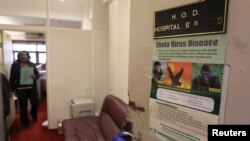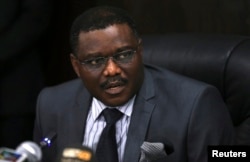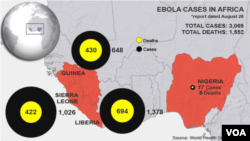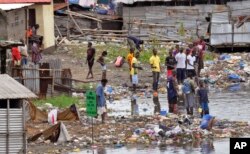As fears of Ebola spread across West Africa, some Nigerians are rejecting the idea of building Ebola isolation units in their neighborhoods.
In parts of Nigeria prone to communal violence, locals took to the streets this week, saying they would sooner burn Ebola centers down than allow them to operate.
In many parts of Nigeria, residents say they are more afraid of Ebola than of Boko Haram, the militant group that has killed thousands of people this year alone.
In the northern city of Kaduna Wednesday, where Boko Haram has struck many times, hundreds of people protested plans to convert sections of a local clinic into an Ebola treatment center.
Many carried signs that said: "No Ebola in our hospital."
“They are kicking against it that it should not be situated here. Not that government should not do what it is supposed to do. But situating it here is what they are against," said Danjuma Musa, a religious leader in Down Quarters, where the hospital is located.
On Thursday, Nigerian Minister of Health Onyebuchi Chukwu said what the government should and must do is prepare for the possibility of a widespread outbreak regardless of objections he calls “irrational fear.”
Nigeria has recorded 15 cases of Ebola and six deaths since the disease came to Nigeria in July. The World Health Organization said Thursday more than 1,500 people have died since the West Africa outbreak began early this year, nearly all in Guinea, Sierra Leone and Liberia.
The outbreak is also growing faster, it said, with 40 percent of new cases recorded in the past 21 days.
The health minister says Kaduna residents and other communities that have objected to Ebola centers will be in no danger because patients will not mingle with anyone outside the hospital.
“Even family members are not even permitted. You’re a man? Your wife is not even permitted. You’re a woman? Your husband, your children, they are not even permitted. So I don’t know how people now think they will get Ebola because we are treating. In any case, people might as well ask all hospitals be removed from their cities,” said Chukwu.
But protesters say they are not only afraid of the disease spreading.
Nigerians are watching harrowing scenes from the Liberian capital, Monrovia, where a forced quarantine in a massive city slum has led to deadly clashes between residents and soldiers.
In Kaduna, where thousands of people have died in clashes in the past two decades, political rallies and protests are banned. Some residents that attended the protest Wednesday say they fear an Ebola center could spark public outrage and more violence.
“When you look at the number of people that came out yesterday protesting, at least that can trigger something else in the state. But thank God, we did things peacefully,” said Ibrahim Shehu, who chairs the clinic’s board.
Business concerns
Other residents say Nigerians are so afraid of Ebola in general, that even if the isolation unit has no patients, its presence will keep people out of the neighborhood, killing their businesses.
“When there is something dangerous nobody will patronize you. People will run away from you,” said Abdullahi Mohammed Barnawa, who sells wood at a market near the clinic.
Like some other Kaduna residents, Barnawa mistakenly believes Ebola is airborne, when in reality it spreads through contact with bodily fluids, making it much harder to catch.
Officials say they are working dispel rumors like this with TV ads, radio jingles and educational flyers, warning that false information can sometimes be as deadly as Ebola.
Ibrahima Yakubu contributed to this report from Kaduna.








